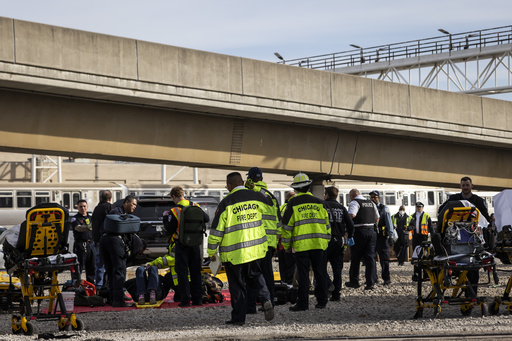
CHICAGO — Federal authorities have reported that the operator of a Chicago commuter train involved in a crash nearly a year ago tested positive for alcohol.
The incident took place on November 16 when a Chicago Transit Authority (CTA) train collided with a slow-moving snow plow located on the tracks, resulting in injuries to 38 individuals, which included the train conductor.
According to a report from the National Transportation Safety Board (NTSB), a hospital examination determined that the 47-year-old train operator had a blood-alcohol level of 0.06% approximately one hour post-incident.
This figure is above the federal threshold of 0.02% and beneath Illinois’s legal limit of 0.08%.
Further analyses conducted at a federal laboratory indicated his blood-alcohol concentration was 0.048%, as detailed in a report released in early August.
The CTA has stated that they are unable to comment further due to the ongoing investigation by the NTSB.
However, the agency did confirm it regularly oversees drug and alcohol testing for employees, conducting hundreds of random screenings each month.
The report also notes that the train operator, employed since 2021, had never undergone a random drug or alcohol test during his employment.
In discussions with investigators, the operator mentioned problems with the train’s braking system leading up to the accident.
He described the situation, stating, “I got the brake down, but I’m still feeling a little push on the train, so I’m like, I’m pulling it down.”
He communicated over the radio, alerting that the “train [was] not stopping,” expressing concern for his safety.
NTSB investigators indicated they were examining potential design flaws in the braking system soon after the crash occurred.
Preliminary analysis suggested that the train impacted the snow plow while traveling at a speed of 26.9 mph (43.3 kph).
The snow plow was present on the tracks as part of winter training drills.
An instructor operating the plow informed investigators that it seemed as though the train operator attempted to brake but recognized a collision was unavoidable.
“I was praying and hoping that it would stop, but the speed that the train was coming, I already knew that it wasn’t going to stop,” the instructor recounted.
After the crash, the instructor suffered a head injury and was momentarily unconscious but acknowledged that the conductor did manage to slow the train somewhat, likely preventing further casualties.
“The operator is the real hero because if [he] didn’t slow down that train, I probably wouldn’t be here with you guys right now,” the instructor remarked to investigators.
